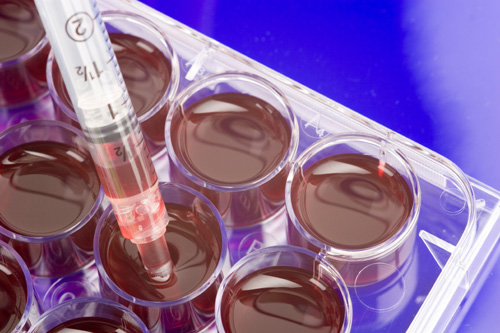Delivering on the Promise?
Regenocyte—an independent biotechnology firm—is exploring the potential of adult stem cells for cardiovascular and severe lung disease. For more about the experimental process from lead researcher Dr. Zannos Grekos and for patient stories, visit Regenocyte – Adult Stem Cell Therapy or call The Heart and Vascular Institute in Naples, Florida, at 866-216-5710.
News Worth Knowing
With so much adult stem cell research underway, it can be tough to keep track of it all. Here are more breakthroughs that are worth keeping an eye on.
Crohn’s Disease: Resetting the Immune System
For sufferers of Crohn’s disease, everyday life can feel like a never-ending bout of food poisoning. The disease arises when the immune system attacks the stomach and intestines, causing abdominal pain, diarrhea, and vomiting. No cure for the condition has yet been found, but Julian Panes, a gastroenterologist at the Hospital Clinic in Barcelona, Spain, thinks he may have hit on the most effective treatment yet: giving chronic Crohn’s patients an infusion of their own adult stem cells to “reset” their immune systems, ending the body’s misguided efforts to attack the digestive system.
The procedure Dr. Panes uses is a straightforward but grueling one. First, patients receive a round of chemotherapy to depress their immune systems, then blood is drawn to obtain a critical mass of adult stem cells. “We check that there is a sufficient number of cells to complete two procedures, just to make sure we are on the safe side,” Dr. Panes says. “After another round of chemotherapy, we infuse the cells into the patient, and the cells populate the bone marrow.” So far, he adds, the treatment seems to result in quick and effective healing of patients’ damaged digestive tissue. “We already have four patients that have been transplanted for more than a year, and three of them are completely without any symptoms. The disease made them miserable, and now they have a normal life.” Dr. Panes plans to begin large-scale clinical trials of the treatment within the next few years.
Reconstructive Surgery: The Next Level
Jeremy Mao, director of the Tissue Engineering and Regenerative Medicine Laboratory at Columbia University’s College of Dental Medicine, thinks he’ll someday be able to do lasting reconstructions of the breast and skin using soft-tissue implants studded with adult stem cells.
In a 2007 animal study, Dr. Mao demonstrated the viability of his technique. First, he inserted adult stem cells that generate fatty tissue into minuscule channels etched in hydrogel implants. He added a growth factor known to promote the development of blood-vessel tissue. Then he transplanted the hydrogel cylinders into mice. He observed that fatty tissue grew in the region of each cylinder—and that it stayed healthy because networks of blood vessels formed to support the new tissue. “When you put micro-channels in the hydrogel, they become a conduit for the blood vessels,” he says.
If Dr. Mao’s technique works in humans, surgeons may be able to perform successful breast reconstructions without silicone and design facial soft-tissue implants that actually hold their shape. Dr. Mao also thinks his method of engineering tissue with its own blood vessel supply will eventually help researchers who use stem cells to build replacement kidneys and livers. “The work we are doing could be informative for more complex organs.”
For more, read “The Post Investigates: The Other Stem Cells,” in the Jan/Feb 2010 issue of The Saturday Evening Post, on newsstands through February. Subscribe online or purchase the issue at ShopThePost.com.
Become a Saturday Evening Post member and enjoy unlimited access. Subscribe now




Comments
Hi Jeff: I don’t know whether this works or not–for Crohn’s disease–it interested me first for circulatory problems. Best wishes. Bob Meyer
By now M. Straulka probably knows of Regenocyte’s successful treatment of Chrohn’s as per the Post’s article.
Mr. Taylor, several stemcell treatment organizations do treat diabetis. Google
“stemcell treatment”.
I had stemcell treatment for cardiomyopathy performed by Dr. Don Roberto Fernandez Vina last August. He treats other diseases also. His clinic and
foundation is in Argentina, but he also treats patients in El Salvador.
It is just too bad that we have to go overseas, to Europe, the Caribbean or Central
America where these treatments take place while the U.S. is lagging behind due to bureaucracy.
i am 70 yrs. and have severe crohns, this chronic condition has caused myelodysplastic syndrome ( preleukemia ). i am wondering if these stem cells would help or would be to much for me. i have crohns since i was 30. any thing that would help make my remaining years better would be wonderful. i think all of my life has been crohns.
any comment i would appreciate. thankyou.
mary straulka
I have a friend that is a diabetic 2 and he has to be on the machine to cleanse
his body of the impurities. Neither of his kidneys work now. Is it possible to use
stem cells in this situation? He is going on the machine 3 days a week and trying
to work at a radio station as much as possible. He is such a lovely person and his
wife also. He is waiting on a kidney along with 700 more people. Is there anything
you can do or do you know of anybody that can help him?